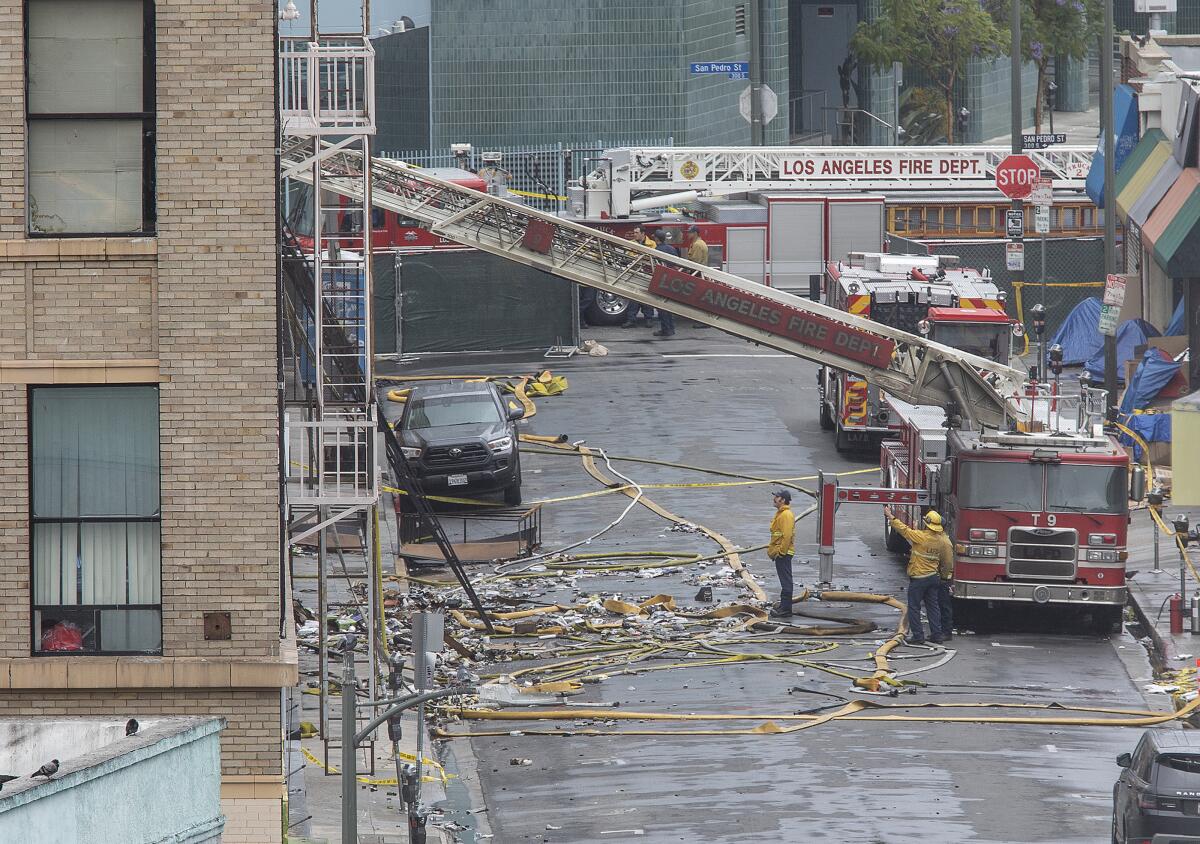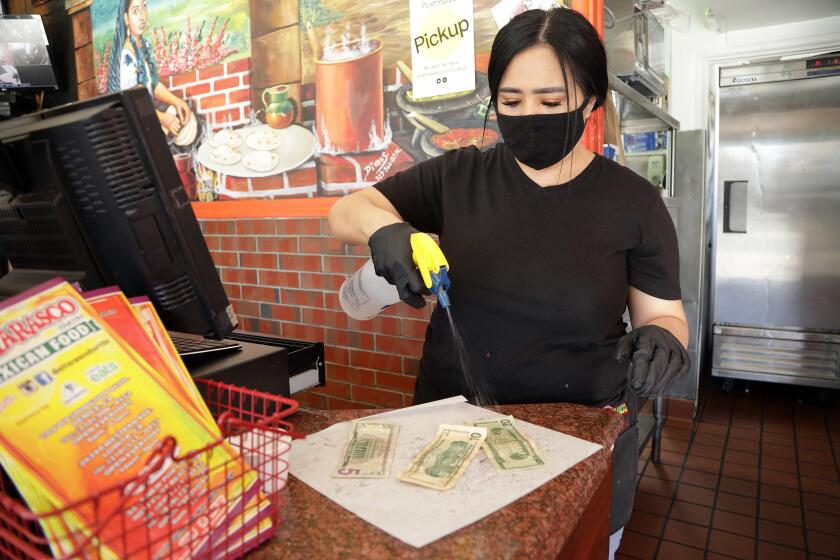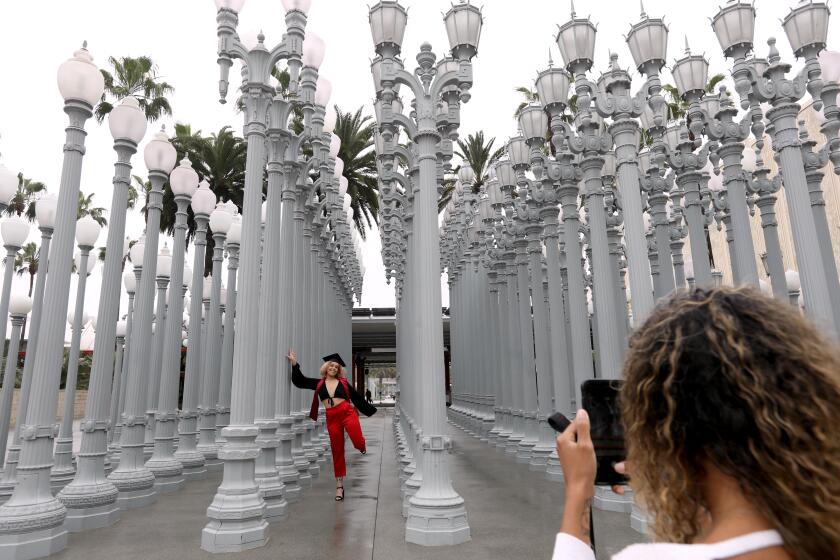L.A. Fire Department to inspect vape and smoke shops after downtown explosion

The Los Angeles Fire Department will launch a citywide review of the way certain businesses store volatile materials after an explosion seriously injured several firefighters in a downtown corridor that some consider a haven for supplies used in the creation of unlicensed cannabis products.
Fire Chief Ralph Terrazas said Tuesday that every fire station in Los Angeles would work to identify businesses similar to Smoke Tokes, an East 3rd Street wholesaler that went up in flames Saturday night.
An explosion there left a dozen firefighters injured, including several who were severely burned. Carbon dioxide and butane canisters were found inside the building, though investigators have yet to determine the cause of the blaze, authorities said.
“Those types of businesses pose a threat to the people who work there, the public that goes there, and firefighters if they have to respond there,” Terrazas said.
The review will involve each fire station in the city identifying businesses that store volatile chemicals and ensuring they are stored properly. Those businesses are required to display a diamond placard, which would alert emergency personnel that there are potentially flammable and hazardous materials inside.
Smoke Tokes did not have such a placard, which is normally issued by the city after an inspector confirms the business is housing volatile materials properly, the chief said. In Los Angeles, there is a permit system for the storage of large quantities of flammable gases, and proprietors are required to document what they have on site.
Los Angeles Times’ visual coverage of the coronavirus crisis
“We have 106 fire stations. We will canvass the city. We will identify the businesses. We will transmit that information to the fire prevention bureau, and then we start inspecting them all,” Terrazas said of the review, which will be launched upon completion of the investigation into the downtown blast.
The investigation into the explosion is likely to take several weeks. Attempts to contact the owner of Smoke Tokes have been unsuccessful.
The explosion Saturday night damaged several storefronts, melted fire helmets and left one firetruck burned and covered in debris. A Fire Department spokesman said firefighters fled the building having suffered burns and ran through a fireball to escape.
Investigators are trying to determine what drove the intensity and ferocity of the flames, the size of which Terrazas said was abnormal.
“That very unusual fire behavior presents a new threat to our firefighters and to the public, to the people who work in those businesses and facilities,” he said after watching footage that captured what were believed to be the fire’s most intense moments.
Three firefighters remain hospitalized, according to Terrazas. Capt. Victor Aguirre suffered third-degree burns and has a “long road to recovery,” the chief said. A GoFundMe campaign to aid in his recovery has already raised more than $150,000.
The explosion happened in the heart of a downtown L.A. business district that some police officers have nicknamed “bong row” because of the concentration of retailers selling rolling papers, butane and other supplies associated with vaping, tobacco and the extraction of THC for marijuana vape cartridges.
Smoke Tokes is not a cannabis business, and three law enforcement sources told the L.A. Times that neither an extraction laboratory setup nor cannabis was found inside the building. A criminal investigation into the blast will be focused on whether volatile or explosive substances were stored improperly, the sources said.
Visual look at the third phase to reopen California amid the coronavirus outbreak.
The sources spoke on condition of anonymity because they did not have permission to discuss the ongoing inquiry, which involves more than 50 investigators from the Fire Department, the Los Angeles Police Department and the U.S. Bureau of Alcohol, Tobacco, Firearms and Explosives.
Terrazas said there had been fires at similar businesses downtown and throughout Los Angeles in recent years.
An explosion rocked the area in 2016, when a property that also bore the name Smoke Tokes caught fire at a nearby address on 3rd Street. Fire officials could not confirm if the businesses were owned by the same person. The owner of the structure involved in Saturday’s explosion also owns another retailer on nearby Boyd Street, called Green Buddha USA, records show.
Last March, two men were critically injured after an explosion in a building that contained what investigators described as a “possible honey butane lab operation” in Canoga Park, according to LAFD documents.
Saturday’s blast has caused concern among retailers and business operators in the legal cannabis market. Some say stretches of 3rd, Wall and Boyd streets are havens for the sale of butane and other supplies needed by those engaged in the sale of unlicensed cannabis products.
“In our experiences, it’s a well-known area for one-stop supplying of illicit cannabis extraction products and counterfeit vape manufacturing,” said Wesley Hein, head of compliance and government affairs for Mammoth Distribution in Woodland Hills.
Erik Hultstrom, founder of Legacy Strains and a member of the Southern California Coalition, a cannabis trade organization, said the sale of such large quantities of butane had been going on in the area for well over 10 years and was fueled by the unlicensed marijuana trade.
While legal cannabis dispensaries buy vape pens and other finished products from licensed distributors, Hultstrom said, unlicensed manufacturers can find many of the supplies needed to craft their own products in the downtown corridor.
“A licensed manufacturer would not be buying cases of butane cans from head shop row. Nobody reasonable is buying 128 cans of butane to fill lighters,” he said. “You can almost liken this back to when people would make bathtub gin and put antifreeze in it. This exists because there’s illicit products.”
A document obtained by The Times showed that at least one Boyd Street store in the area was hit with a cease-and-desist letter last year after allegations surfaced that it was selling counterfeit packaging meant to imitate a popular marijuana brand. Knockoff marijuana products are the lifeblood of the city’s unlicensed cannabis economy, experts have said.
A 2019 Leafly investigation also found businesses in the area had been selling vitamin E oil to be used as an additive for vape oils. The U.S. Centers for Disease Control and Prevention later linked vitamin E acetate to a rash of hospitalizations stemming from the use of e-cigarettes and vape pens.
Los Angeles has struggled to tamp down on its illegal cannabis market. A Times investigation last year found that the number of unlicensed dispensaries in the city outpaced the number of licensed operators, though city officials have since expanded their measures to combat the marijuana black market to include cutting off water and power at such shops.
Hein says that although many of the businesses in the downtown area where the explosion happened operate legally, their businesses are propped up by selling to people involved in unlicensed cannabis sales.
“If one wanted to make an illicit cannabis product, one would need the following things: You would need cannabis oil. You would need terpenes. For those who wanted to make even more profits, you would need additives such as vitamin E acetate. You would need cartridges and you would need packaging,” he said.
“All of those are available or have been available, quite readily, in those three to four blocks.”
More to Read
Sign up for Essential California
The most important California stories and recommendations in your inbox every morning.
You may occasionally receive promotional content from the Los Angeles Times.













